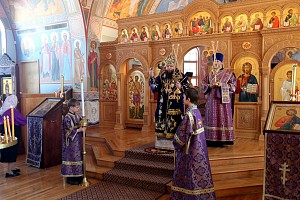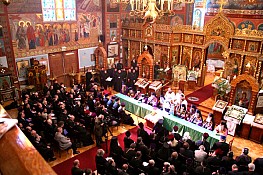Beloved in the Lord Parish Rectors, Directors & Teachers of Parish & Sunday schools!
With our blessing and in the framework of the initiated program "School Piggy Bank," the Prince Vladimir Youth Association (www.youthpv.org), together with the Synodal Youth Department, is organizing financial assistance to the St. Elizabeth Special Needs Orphanage in Minsk, Belarus. Most of the children have never had a home and do not know parental warmth. Many of them have complex diagnoses, but are given loving attention by the sisters of the St. Elizabeth Convent.
During Great Lent, this good deed will take the form of a program known as the “School Piggy Bank”. We appeal to you to help support these poor orphans. Every penny donated by your children will mean a great deal. Collected funds will be of great us and support to these parentless children. They will especially happy to know that children their age provided the needed assistance.
Christian love is expressed in actions and thanks to your efforts last year we were able to build a needed playground for orphans outside of St. Petersburg Russia. We hope that this Great Lent, your children will express their love for God and their neighbor by helping the needy children of Minsk, which will also be a stimulus to Christian growth.
Donations should be collected up until Palm Sunday, inclusively. Checks should be written out to "Prince Vladimir Youth Association" and sent ℅ Archpriest Andrei Sommer (senior priest of the Synodal Cathedral of the Sign) at 75 E 93rd Street, New York, NY 10128, no later than April 20, 2018. Other arrangement can be made with Fr. Andrei by phone at (646) 320-7382 or e-mail: youthpv@gmail.com. All parish schools will be provided with a report on how their collected donations were used.
We thank you and call down on your God-pleasing labors God’s blessings.
With love in the Lord,
+HILARION
Metropolitan of Eastern America & New York
First Hierarch of the Russian Church Abroad
Since the time of Archbishop Averky (Taushev; +1976), there has been a tradition for a ruling or vicar bishop of the Eastern American Diocese to visit Protection of the Mother of God Church in Rochester, NY every years on the second Sunday of Great Lent. This tradition was continued, first by Metropolitan Laurus (+2008), and currently by His Grace Nicholas, Bishop of Manhattan.
The diocesan vicar arrived in Rochester on Saturday evening, March 3. The following morning, the Sunday of St. Gregory Palamas, His Grace celebrated Divine Liturgy, co-served by parish rector Archpriest Gregory Naumenko, Abbot Theophyact (Clapper-DeWell; cleric of Holy Trinity Monastery in Jordanville, NY), and Protodeacon Andrej Strapko and Deacon Nikifor Franklin (parish clerics). Assisting with the service were many acolytes, most of whom have grown up in the parish and are being trained to serve in the holy altar.
At the Little Entrance, with the blessing of His Eminence, Metropolitan Hilarion, Fr. Nikifor was elevated to the rank of protodeacon.
Two choirs sang at the Divine Liturgy in Slavonic and English: the regular parish choir and the newly formed youth choir. Bishop Nicholas delivered an inspiring sermon in Russian and English.
After Liturgy, everyone joined His Grace in the parish hall for a satisfying Lenten meal prepared by the sisterhood.
– In your opinion, why are parts of the Russian mass media skeptical about Orthodox life in Russia?
– Man has a sinful nature: it is much easier to discuss scandals, point out evils, than to have a spiritual conversation, to regret one’s own fallen nature. The Gospel says "And why beholdest thou the mote that is in thy brother’s eye, but considerest not the beam that is in thine own eye?" This is nothing new.
People ask on Orthodox Christian websites: how do we respond to criticism of the Church, should we tolerate it, pay any attention? Some clergymen in Russia find the courage to say: let us refuse luxury, expensive cars, let us attract people to religious life through personal example, not only in word, but in deed. Sometimes one should consider whether criticism and accusations have merit. We clergymen should avoid providing fodder for such criticism.
– Another difficult question for Orthodox Christians is Ukraine…
– Our hearts bleed for Ukraine, half of my parishioners are Ukrainians, I am half Ukrainian myself, my wife, Matushka Maria, is a great-granddaughter of Mikhail Rodzianko. We pray for peace in Ukraine at every Liturgy.
There is an artificial division in the Church, antagonism is imposed from without. We empathize with His Beatitude Onufry, Metropolitan of Kiev & All Ukraine; of course, he is having a very difficult time, he is a genuine spiritual ascetic and is trying to restore peace. He keeps saying: Christ must be foremost in our minds, everything else is secondary. We also commemorate His Holiness Kyrill, Patriarch of Moscow & All Russia at every Liturgy, we pray for the strengthening of faith and of the Church in both Russia and Ukraine.
– We recently marked the decennial of the unification of our Churches; what can you say about this?
– I rejoice that, ten years ago, the Primates of the Moscow Patriarchate and ROCOR found the spiritual prudence to overcome division between the two branches of the Church, and commence restoration of Eucharistic unity. The late Patriarch Alexey II and Metropolitan Laurus (Škurla; 1928-2008) of Eastern America & New York, First Hierarch of ROCOR, signed the Act of Canonical Communion, which crowned the healing of the 90-year division in the Russian Orthodox Church.
It is noteworthy that both hierarchs were born outside of Russia. The Patriarch was born in Estonia, of course, and Metropolitan Laurus was born in Carpathia. The Lord specifically chose them, since both likely understood the abnormality of the situation and the need for healing.
– What are the positives that you see?
– This blessed beginning has benefited the Church. It gives us the opportunity to serve together, we now have one Church, we commune of the Holy Gifts and celebrate Liturgy together.
Clerics from Russia visit us, whom we welcome with open arms; for instance, we recently had Metropolitan Hilarion of Volokolamsk celebrate services at our cathedral. We travel to Russia and they likewise welcome us with love. We celebrated that important event at a seminar in Moscow’s Sretensky Monastery titled "The Unifier: St. John of Shanghai & San Francisco."
The righteous man of God always strove for the unity of the two Churches, he considered the Russian Church Abroad an inseparable part of the Russian Church.
– You were a delegate at that Church Council at which the fateful decision was made; can you tell us about it?
– In May, 2006, the 4th All-Diaspora Council of the Russian Orthodox Church Outside of Russia was held in San Francisco, at which the matter of reunification was discussed. I believe that the reunification of the Church was the result of the prayers of St. John of Shanghai. The debates were difficult, not all the delegates supported unity.
Many people spoke, and the optimism that I shared with some delegates faded after a few hours, it seemed we could never achieve unanimity.
At one point, it was proposed that a resolution on Eucharistic communion with the Moscow Patriarchate be drafted. Archpriest Alexander Lebedeff, the Secretary of the Council and Rector of Transfiguration of the Lord Cathedral in Los Angeles, told me that the process was difficult and at one point they reached an impasse.
Then they decided to have a recess, and to go to the cathedral and pray to St. John of Shanghai before his relics. A draft resolution was placed on his chest, along with a list of names of the delegates of the Council. Fervent prayer then instilled in us the confidence that everything will happen according to God’s will. After the moleben, the drafting of the resolution went smoothly.
Metropolitan Laurus surprised everyone by proposing that we vote not on the entire resolution, but on each paragraph individually. Most of the delegates voted for unification. I sensed that St. John was with us! In 2007, the important historic event took place, the signing of the Act of Canonical Communion.
– You have a lot of young people in your parish, how are you able to keep them engaged?
– Our parents reared us with the understanding that we must preserve the Orthodox Christian Faith, our Russianness, our language. It’s not easy. It’s very easy to assimilate to American culture.
Young parents who recently immigrated to the US but never went to church in Russia want to attract their children to the Orthodox Faith, to speak Russian. Within the walls of the church, children come to the Faith, learn to love God, hear the Russian tongue, take part in various events…
The most important thing is to instill love for one’s historic homeland, for one’s spiritual roots; to help understand our historic homeland and the role of the Orthodox Church in shaping Russia itself.
– You are talking about parish life?
– Yes, parish life and other efforts, including through the scout organizations.
Our scout chapter gathers at the parish twice a month. Every summer, the kids spend two weeks in camp in a picturesque area of Virginia. The kids erect their own tents, make an iconostasis out of branches and install icons in them. One of our priests celebrates Divine Liturgy there, and leads spiritual discussions with the children under the open skies. We priests also live in tents during this time.
– Your young parishioners are also taught dancing…
– We have a dance troupe called "Matryoshka." Our ladies teach Russian folk dancing, and the kids perform in traditional Russian costumes. Boys and girls are taught Russian dancing and love for Russian folk culture, and they get to know each other better.
– Your parish is bilingual?
– We celebrate two Liturgies every Sunday, in English and Slavonic. We have American parishioners, Romanians, Serbs, even some Chinese people. After the first service, everyone goes to the hall to have breakfast, and after the second Liturgy, to lunch. The parishioners prepare all of the meals themselves.
We have Russian and English Sunday schools, where we teach the Law of God. Thus we strive to preserve our children in the Orthodox Faith and culture.
Interview by Alexandra Gripas of www.pravoslavie.fm
Translation by www.synod.com



